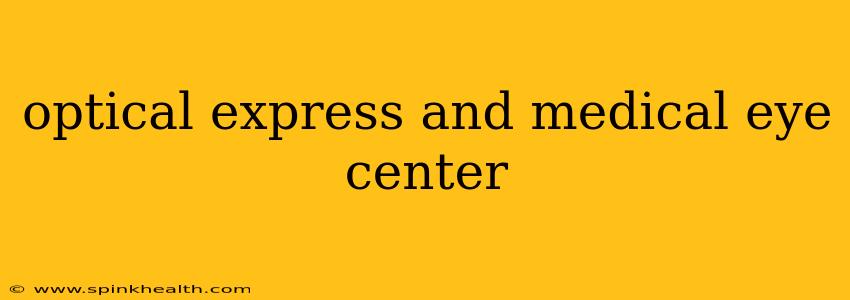Optical Express vs. Medical Eye Center: Choosing the Right Eye Care Provider
The world of eye care can feel overwhelming. With numerous options available, deciding between a large chain like Optical Express and a more specialized Medical Eye Center can be a significant challenge. This isn't simply a choice between cheaper glasses and advanced procedures; it's about understanding your individual needs and finding the best fit for your eye health journey. Let's delve into the key differences to help you make an informed decision.
My name is Dr. Evelyn Reed, and I've spent over 15 years working in various ophthalmological settings. While I'm not affiliated with any specific provider, my experience allows me to offer a balanced perspective on this common dilemma.
What Services Does Optical Express Offer?
Optical Express is primarily known for its comprehensive eye examination services and a wide selection of eyeglasses and contact lenses. They often market themselves on convenience and affordability, attracting customers seeking a one-stop shop for all their visual needs. Their focus is largely on refractive error correction, such as nearsightedness, farsightedness, and astigmatism, usually through laser eye surgery or traditional corrective lenses.
What Services Does a Medical Eye Center Offer?
Medical Eye Centers, on the other hand, tend to offer a broader range of services. They're typically staffed by ophthalmologists and optometrists, providing comprehensive eye exams, diagnosing and treating various eye diseases (like glaucoma, cataracts, and macular degeneration), and performing complex surgical procedures. Their focus extends beyond simply correcting vision to maintaining overall eye health.
What are the key differences between Optical Express and a Medical Eye Center?
This is often the first question prospective patients ask. The fundamental difference lies in the scope of services and the qualifications of the practitioners. Optical Express primarily focuses on vision correction, while Medical Eye Centers encompass a wider spectrum of eye care, including diagnosis and treatment of eye diseases.
Is Optical Express suitable for treating eye diseases?
No, Optical Express is not equipped to diagnose or treat many eye diseases. They primarily focus on refractive error correction. For conditions like glaucoma, cataracts, or macular degeneration, you need to consult a Medical Eye Center or an ophthalmologist.
What are the pros and cons of Optical Express?
Pros: Convenient location, wide selection of frames, potentially lower prices for routine eye exams and glasses.
Cons: Limited services compared to Medical Eye Centers, potentially less personalized care, might not be suitable for complex eye problems.
What are the pros and cons of a Medical Eye Center?
Pros: Comprehensive eye care, diagnosis and treatment of eye diseases, specialized surgical procedures, personalized care from experienced ophthalmologists.
Cons: Can be more expensive, appointments might require more scheduling, not all locations offer every service.
How do I choose between Optical Express and a Medical Eye Center?
The best choice depends entirely on your individual needs.
- Routine eye exams and glasses: Optical Express might suffice.
- Suspected or diagnosed eye disease: You need a Medical Eye Center or an ophthalmologist.
- Complex eye surgery: You will definitely require a Medical Eye Center.
Ultimately, your decision should be guided by the advice of a qualified eye care professional. Always prioritize your eye health and seek a provider who offers the expertise and services necessary to meet your specific needs. Remember to schedule a comprehensive eye exam with a qualified professional to determine the best course of action for you. This is about more than just good vision; it's about protecting your precious eyesight.

